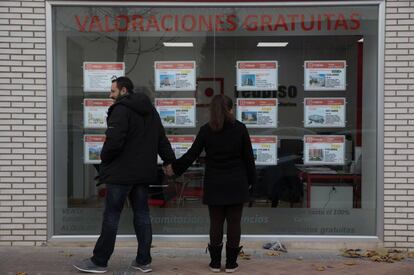Spain introduces new rental rules with more safeguards for tenants
Contract periods are extended, price hikes are contained, and evictions must first be notified with social services

A new government decree regulating rentals in Spain went into effect on Wednesday, five days after being approved by the Cabinet. The measures introduced by the government of Prime Minister Pedro Sánchez, of the Socialist Party (PSOE), seek to improve protection for tenants at a time when affordable housing is becoming increasingly difficult to find.
The decree extends the duration of the rental contract from three to five years (or seven if the landlord is a company), and prevents annual rent hikes of more than the consumer price index (CPI) within that period. The new rules do not put a cap on how much monthly rent a landlord can ask for, as the anti-austerity party Podemos had lobbied for.
The main changes will only apply to new lease agreements signed on March 6 and later
Deputy Prime Minister Carmen Calvo said last week that the decree is “an action plan for an unacceptable situation,” adding that the measures will be particularly helpful for young people.
Like all government decrees, this one will have to be ratified by Congress within a month. But because of the snap election called for April 28, parliament has been dissolved and this task will fall to a permanent congressional committee. The PSOE executive has already secured pledges of support from left-wing group Podemos and the Catalan nationalist party PdeCAT. The Basque Nationalist Party (PNV) is expected to back the decree as well.
The main changes will only apply to new lease agreements signed on March 6 and later. Earlier ones will continue to be covered by the previous legislation, although if both parties agree and there is no legal impediment, older contracts may be upgraded to reflect the new situation.
These are the key aspects of the decree:
Contracts extended. The minimum length of a contract has been extended from three to five years (or seven if the landlord is a business). To provide greater stability for tenants, the period of tacit renewal has been extended from one to three years. After the mandatory renewal period, landlords must give four months’ notice to end the contract and tenants must give two. Previously, owners could give two months’ notice and tenants one.
Rent hikes limited to CPI. While earlier contracts could establish their own provisions for annual reviews, the new decree prevents annual rent hikes of more than the consumer price index (CPI) within the contract period.
Price benchmark system. The decree introduces a state benchmark index for rental prices that will be used to follow changes in the market and help determine whether an asking price is adjusted to market realities. This index will provide the average price in any given part of Spain, and undergo annual reviews. The government has given itself eight months to produce the first figures.
Limit on property costs. In addition to a one-month deposit, property owners can only ask a tenant for additional guarantees equivalent to two months of rent. If the landlord is a legal entity, it must cover any real estate agency expenses.
More security for tenants. The decree equally recognizes contracts registered with the Property Registry and those that have not been registered. In other words, if someone buys a property that is already rented out, they must respect the tenant’s lease agreement.
Evictions. All eviction processes will go through the social services first to determine whether a tenant is in a vulnerable situation. If so, the eviction process will be pushed back one month (three if the owner is a business) to help the tenant find a new place to stay. Judges must also communicate the exact date and time that the eviction will take place.
Vacation rentals. The decree says that a building’s apartment owners may collectively agree to place limits on the use of units for the purposes of tourist accommodation. The measure comes amid growing public debate over the impact of online services such as Airbnb on city centers and on the price of housing.
English version by Melissa Kitson and Susana Urra.
Tu suscripción se está usando en otro dispositivo
¿Quieres añadir otro usuario a tu suscripción?
Si continúas leyendo en este dispositivo, no se podrá leer en el otro.
FlechaTu suscripción se está usando en otro dispositivo y solo puedes acceder a EL PAÍS desde un dispositivo a la vez.
Si quieres compartir tu cuenta, cambia tu suscripción a la modalidad Premium, así podrás añadir otro usuario. Cada uno accederá con su propia cuenta de email, lo que os permitirá personalizar vuestra experiencia en EL PAÍS.
¿Tienes una suscripción de empresa? Accede aquí para contratar más cuentas.
En el caso de no saber quién está usando tu cuenta, te recomendamos cambiar tu contraseña aquí.
Si decides continuar compartiendo tu cuenta, este mensaje se mostrará en tu dispositivo y en el de la otra persona que está usando tu cuenta de forma indefinida, afectando a tu experiencia de lectura. Puedes consultar aquí los términos y condiciones de la suscripción digital.








































